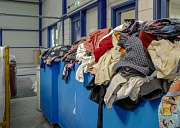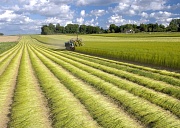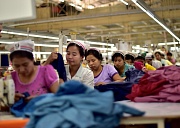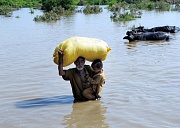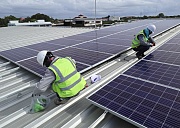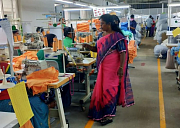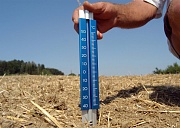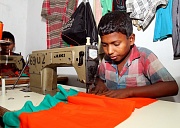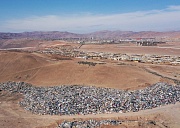Last summer’s floods in Pakistan displaced seven million people, caused a death toll of over 1,500 and damages of an estimated $30 billion, with only $5.6 billion covered by insurance. As just one instance of the increasing number of extreme weather events caused by the climate crisis, the floods demonstrated how vulnerable people in the poorest countries are suffering the most, writes Alison Ward, CEO of CottonConnect..
Farmers have been especially affected, in a country where agriculture is the primary source of income in many regions. With flood waters receding slowly much farmland remained submerged well into the autumn or even later. The result for many farmers was the loss of last year’s crop, and this year’s is at risk too. Many were forced into debt as a result, and in the midst of a public health and humanitarian crisis, their options are extremely limited.
Sadly, this scenario could become all too common. Agriculture is one of the most at-risk industries from the climate change emergency. As the global rise in floods, heatwaves, droughts, storms, cyclones, hurricanes and mudslides shows no sign of stopping, it’s up to all of us working in the clothing sector to help the farmers on the frontline. They don’t just need immediate aid in times of emergency but also long-term support to rehabilitate their livelihoods for the future.
Helping farmers in the world’s most vulnerable regions is not just the right thing to do, but is vital in order to help mitigate risks to long-term supply. Companies across global textile and clothing supply chains will only be able to keep their own businesses viable long-term if the farmers they rely on can adapt and build resilience.
At CottonConnect, a social enterprise working to make the cotton supply chain more equitable and sustainable, we have been working with cotton farmers in Bangladesh, China, India and Pakistan for over ten years – helping them tackle and adapt to the climate change crisis. We have seen at first-hand the issues they face. Thanks to this experience, we have four crucial insights when considering how to help farmers adapt to climate change:
On-the-ground support
The impact of the climate crisis differs from region to region. Successful adaptation depends on local knowledge and support. People on the ground know what the specific local problems are – and how to mitigate them.
Over the last decade, we have worked hard to use local knowledge to underpin our initiatives. We have given thousands of farmers the training and tools that will boost their productivity, profitability and incomes. The key is to work with local partners along with agronomists and agri-experts to support farmers in building resilience toward climate crisis.
In response to the devastating floods across Pakistan, we worked with our local partners to help farming communities rebuild their lives. With their help, we carried out comprehensive needs assessments in different regions to establish tailored support required by farmers and their families. The aim wasn’t just to ensure their health and safety in the immediate aftermath of the floods but to rebuild their lives and livelihoods for the long term.
Building farmer capacity through technology and training
To recover faster from extreme weather events, like floods and droughts, it’s essential that farmers have the right infrastructure, the latest information and the best tools. For example, weather advise from AI can better prepare farmers, and training in soil management and proper drainage systems can help remove water more quickly from fields in the event of flooding.
It is also important to help farmers to adopt new technology and then scale these solutions. Climate-smart agricultural practices such as short-duration crop, intercropping, multi-cropping and agroforestry methods can help improve financial status to better deal with climate change.To ensure all this is possible, training that’s tailored to each region and its farmers is vital.
Shifting gender norms
Women are often the most vulnerable to the impact of climate change, but conversely, the ones with the best knowledge of how to adapt. It’s, therefore, crucial that we train both men and women in adaptation methods. That way, men can appreciate the key role that women play. Moreover, the burden to find solutions is shared, encouraging collaborative approaches that override gender norms.
Promoting entrepreneurship
Providing small business skills and training can help improve farmers’ access to finance and larger markets. Such entrepreneurial training can also support farmers in generating additional income. By diversifying their economic activities, they can benefit from a more sustainable household income overall.
One example of a female entrepreneur we’ve worked with is mother-of-four Khadija Bibi, from Punjab, Pakistan. She used to work alongside her husband in the cotton fields as a farm labourer. Khadija enrolled for a tailoring training course that’s part of our entrepreneurship programme for women. Later, we gave her a loan of £125, which she used to buy a sewing machine. Today, she not only has a successful sewing business but has already expanded into selling stationery items . The resulting income means her family can afford to live more comfortably.
For the clothing sector, the climate crisis isn’t just about reducing business impacts on the planet. Adapting to changing weather patterns is also an inescapable part of planning for the future. All companies in clothing and textile supply chains must help farmers to adapt. It’s not just the moral thing to do, but also the economic one. To ensure long-term survival – for both frontline farming communities and the fashion industry that depends on them – farmers need help so that climate change adaptation becomes their long-term reality.











